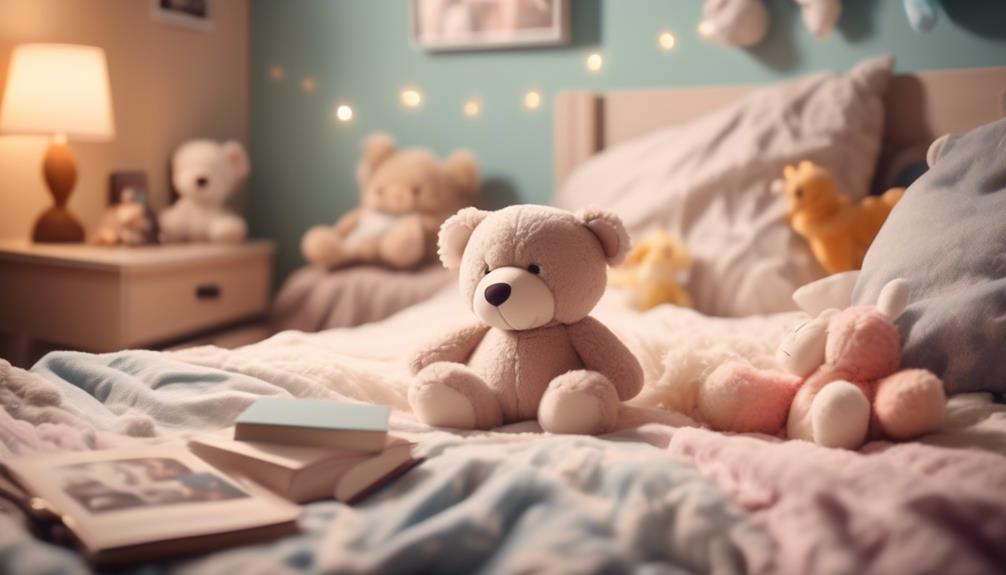How Much Sleep Is Necessary for Preteens to Thrive

Preteens need an average of 9-11 hours of sleep per night to thrive and maintain their physical and mental well-being.
Inadequate sleep can lead to negative consequences, but establishing healthy sleep habits can help unlock their full potential.
Recommended Sleep Duration for Preteens
Preteens, aged 5-11 years, are recommended to get 9-11 hours of sleep per night for optimal health and wellbeing. Getting enough sleep is crucial for preteens as it supports their physical growth, cognitive development, and emotional well-being.
Establishing a consistent sleep schedule is key to ensuring they receive the recommended number of hours of sleep each night. A consistent sleep schedule means going to bed and waking up at the same time every day, even on weekends. This helps regulate the body's internal clock, making it easier for preteens to fall asleep and wake up naturally.
It's also important to create a sleep-friendly environment that's quiet, comfortable, and dimly lit. This can aid in promoting healthy sleep. Having a bedtime routine can also contribute to a good night's sleep. Engaging in calming activities before bed, such as reading a book or taking a warm bath, can help preteens relax and prepare for sleep.
It's essential to limit screen time before bedtime, as the blue light emitted from electronic devices can interfere with the body's natural sleep-wake cycle. If despite following these strategies, your preteen continues to struggle with sleep, it's advisable to seek medical advice. Certain sleep disorders, such as obstructive sleep apnea and bedwetting, are common in this age group and may require further evaluation and treatment.
The Impact of Inadequate Sleep on Preteen Development
Inadequate sleep can have a significant impact on your preteen's development.
Firstly, sleep plays a crucial role in brain development, affecting their ability to concentrate, remember, and manage emotions.
Secondly, lack of sleep can hinder physical growth, as it weakens the immune system and increases the risk of infection and illness.
Lastly, adequate sleep is essential for emotional well-being, with preteens who get enough sleep tending to be settled, happy, and ready for school the next day.
Ensuring your preteen gets sufficient sleep is vital for their overall health and well-being.
Sleep and Brain Development
Lack of sufficient sleep in preteens can significantly hinder their cognitive development and overall well-being. Adequate sleep is crucial for the healthy development of the preteen brain. Here are four important ways in which sleep impacts brain development in children:
- Cognitive Function: Insufficient sleep can impair a preteen's ability to concentrate, remember, and process information effectively. Good sleep habits, such as getting 9-11 hours of sleep per night, are essential for optimal brain function.
- Learning and Memory: Sleep plays a vital role in consolidating and retaining information learned during the day. Inadequate sleep may hinder effective learning, making it harder for preteens to perform well academically.
- Emotional Regulation: Proper sleep allows preteens to better manage their emotions and behave well. Lack of sleep can lead to increased irritability, mood swings, and difficulties in regulating emotions.
- Physical Health: Insufficient sleep weakens the immune system, making preteens more susceptible to illnesses. Establishing a consistent bedtime routine and promoting a calm sleep environment are essential for preteens' overall mental and physical well-being.
Ensuring that preteens get enough sleep is crucial for their optimal brain development and overall health.
Sleep and Physical Growth
Getting enough sleep is crucial for the physical growth and development of preteens. It plays a vital role in cell repair, hormone release during puberty, and overall well-being.
Sleep deprivation can have a negative impact on a preteen's health and well-being. During sleep, the body releases growth hormones that are essential for children to grow and develop. Sufficient sleep also allows the body to repair and regenerate cells, which is important for physical growth. Inadequate sleep can disrupt this process and lead to stunted growth in preteens.
Research has shown that preteens aged 5-11 years require 9-11 hours of sleep per night for optimal physical growth. Therefore, it's crucial to ensure that preteens are getting enough sleep to support their physical development.
Sleep and Emotional Well-Being
To further explore the impact of insufficient sleep on preteen development, let's now delve into the connection between sleep and emotional well-being. Here are four important points to consider:
- Lack of sleep can lead to difficulties in concentrating, remembering, managing emotions, and behaving well in preteens. When they don't get enough sleep, it becomes harder for them to regulate their emotions, leading to mood swings and irritability.
- Inadequate sleep can have a significant impact on the emotional well-being of preteens, affecting their overall mental health and happiness. It can contribute to increased anxiety and depression symptoms, as well as a higher risk of developing behavioral problems.
- Establishing a consistent bedtime routine and creating a tranquil sleep environment are essential strategies to help preteens sleep well and support their emotional well-being. The American Academy of Sleep recommends setting a regular sleep schedule and creating a calm and comfortable sleeping environment to facilitate better sleep.
- Preteens who get enough sleep are likely to be settled, happy, and better prepared for school the next day. Sufficient sleep not only improves their emotional well-being but also enhances their ability to focus, learn, and engage in academic and social activities.
It is clear that adequate sleep plays a crucial role in preteens' emotional well-being and overall development. By prioritizing good sleep habits, parents and caregivers can support the mental health and happiness of preteens.
Sleep Deprivation Symptoms in Preteens
Experiencing sleep deprivation can manifest in preteens through a range of noticeable symptoms. One of the most common signs is irritability and mood changes. When preteens don't get enough sleep, they may become easily frustrated, have frequent mood swings, and exhibit a generally negative demeanor.
Another symptom of sleep deprivation in preteens is poor academic performance and difficulty concentrating. Insufficient sleep can impair their ability to focus, retain information, and perform well in school. It can also lead to increased susceptibility to illness and a weakened immune system. When preteens don't get enough sleep, their bodies are less equipped to fight off infections and they may experience more frequent illnesses.
Excessive daytime sleepiness and fatigue are also common symptoms of sleep deprivation in preteens. They may struggle to stay awake during the day and often feel tired, even after a full night's sleep. Changes in appetite, weight gain, or weight loss can also be linked to sleep deprivation in preteens. When they don't get enough sleep, it can disrupt their body's hunger and satiety signals, leading to changes in eating patterns and potential weight fluctuations.
It's important for preteens to prioritize their sleep and create a comfortable sleep environment to avoid these symptoms and maintain optimal health.
Tips for Establishing a Healthy Sleep Routine for Preteens
Establishing a healthy sleep routine for preteens is crucial in order to address the symptoms of sleep deprivation and promote optimal health and well-being. Here are four tips to help improve your child's sleep:
- Stick to a consistent bedtime: Set a regular sleep schedule for your preteen, ensuring they go to bed and wake up at the same time every day, even on weekends. This helps regulate their body's internal clock and promotes better sleep quality.
- Create a relaxing bedtime routine: Encourage activities that promote relaxation, such as reading a book, taking a warm bath, or practicing deep breathing exercises. Avoid stimulating activities like screen time, as they can interfere with falling asleep.
- Make the bedroom sleep-friendly: Create a comfortable sleep environment by keeping the bedroom cool, dark, and quiet. Remove electronic devices and limit exposure to blue light, which can disrupt sleep patterns.
- Advocate for appropriate school start times: Research shows that preteens and teenagers need more sleep due to changes in their circadian rhythm. Advocate for later school start times to allow your child to get the recommended amount of sleep.
The Role of Technology in Preteen Sleep Patterns
Using technology before bedtime can have a significant impact on preteens' sleep patterns. The blue light emitted by screens can disrupt the production of melatonin, making it harder for them to fall asleep. Additionally, engaging in stimulating activities on electronic devices can lead to heightened alertness, making it challenging for preteens to wind down and relax.
Implementing screen time limits and establishing technology-free periods before bed can help preteens establish healthier sleep patterns and improve the quality of their sleep.
Technology's Impact on Sleep
The excessive use of technology before bedtime can disrupt preteens' sleep patterns and make it difficult for them to fall asleep. Here are four ways technology impacts sleep in preteens:
- Disrupts the sleep-wake cycle: Exposure to blue light emitted by electronic devices like smartphones and tablets can interfere with the body's natural sleep-wake cycle, making it harder for preteens to fall asleep and stay asleep.
- Stimulating activities: Engaging in stimulating activities such as playing video games or using social media on electronic devices can leave preteens feeling alert and unable to wind down before bedtime, further disrupting their sleep.
- Temptation to stay up late: Preteens may be tempted to stay up later than intended if they constantly check notifications or engage in online activities, leading to insufficient sleep.
- Sleep disorders: Excessive technology use can contribute to sleep disorders like sleep apnea in preteens, which can further affect their ability to fall asleep and stay asleep.
To mitigate the negative impact of technology on preteens' sleep patterns, it's important to establish boundaries and set limits on screen time before bed.
Screen Time and Sleep
Excessive screen time before bed can significantly impact the sleep patterns of preteens, disrupting their ability to fall asleep and get quality restorative sleep. According to the Academy of Sleep Medicine, technology usage can have serious consequences on preteens' sleep and wake cycles. The blue light emitted by screens can interfere with the production of melatonin, a hormone that regulates sleep. Exposure to this light suppresses melatonin production, making it harder for preteens to fall asleep.
To sleep better, it's important to set limits on screen time and encourage preteens to have tech-free time before bed. Experts recommend avoiding electronic devices at least 30 minutes before bedtime to promote better sleep. By minimizing screen time, preteens can improve their sleep quality and overall well-being.
Potential Consequences of Sleep Deprivation in Preteens
Sleep deprivation in preteens can have significant consequences on their attention, memory, emotional regulation, and behavior. It's important to understand the potential consequences of sleep deprivation in preteens, as it can greatly impact their overall well-being and development.
Here are four potential consequences of sleep deprivation in preteens:
- Increased risk of difficulties with attention, memory, emotional regulation, and behavior: Lack of adequate sleep can impair preteens' cognitive functions, making it harder for them to focus, remember information, and regulate their emotions. This can negatively affect their academic performance and social interactions.
- Weakened immune system: Sleep deprivation can lead to a weakened immune system in preteens, making them more susceptible to infections and illnesses. This can result in more frequent absences from school and reduced overall health.
- Unsettled behavior and decreased happiness: When preteens don't get enough sleep, they may exhibit unsettled behavior, such as irritability, mood swings, and difficulty managing their emotions. This can lead to decreased happiness and a negative impact on their overall well-being.
- Reduced readiness for school: Sleep-deprived preteens may struggle to stay awake and engaged during school hours, which can hinder their ability to learn effectively. They may have difficulty concentrating, processing information, and retaining what they've learned.
Strategies to Promote Better Sleep for Preteens
To promote better sleep for preteens, establishing a consistent bedtime routine can help them relax and unwind before sleep. A regular routine signals to the body that it's time to wind down and prepares it for rest. Encourage preteens to engage in calming activities such as reading a book, taking a warm bath, or practicing relaxation techniques like deep breathing. These activities can help reduce anxiety and promote a more peaceful transition to sleep.
Creating a sleep-friendly environment is also crucial. Encourage preteens to sleep in a quiet and dimly lit room. This can help promote better sleep quality by minimizing disturbances and creating a peaceful atmosphere. Additionally, maintaining regular sleep and wake times, even on weekends, can support preteens' sleep patterns. Consistency in sleep schedules helps regulate the body's internal clock, making it easier to fall asleep and wake up at the desired times.
Limiting screen time before bedtime is another effective strategy. The blue light emitted by electronic devices can interfere with the production of melatonin, a hormone that regulates sleep. Encourage preteens to avoid using electronic devices at least an hour before bed to ensure a smoother transition to sleep. It's also important to avoid consuming caffeine in the late afternoon and evening as it can make it more difficult for preteens to fall asleep.
Incorporating these strategies to promote better sleep can help preteens in getting enough rest. Sleep is essential for their overall well-being and development. So, let's emphasize the importance of:
- Establishing a consistent bedtime routine
- Creating a sleep-friendly environment
- Maintaining regular sleep and wake times
- Limiting screen time
- Avoiding caffeine
Frequently Asked Questions
How Much Sleep Does a 12 Year Old Need to Grow?
To grow and thrive, a 12-year-old needs sufficient sleep. Inadequate sleep can impact growth in preteens. Establishing a consistent sleep routine and minimizing technology use before bed can improve sleep quality and benefit their overall well-being.
Is 6 Hours of Sleep Enough for a Tween?
No, 6 hours of sleep is not enough for a tween. Sleep deprivation can negatively impact cognitive function, growth hormone production, and overall sleep quality. Preteens need 9-11 hours of sleep to thrive according to sleep recommendations.
What Time Should 12 Year Olds Go to Bed?
You should aim to go to bed at a consistent time every night, as it's crucial for your sleep routine. Getting enough sleep is important for your growth and development, and it can have consequences if you don't. Establishing a bedtime routine and creating a sleep-friendly environment can help you get the rest you need to thrive.
What Is the Sleep Pattern for a 12 Year Old?
To establish a healthy sleep pattern as a 12-year-old, aim for 9-11 hours of sleep per night. Lack of sleep can impact your behavior and overall well-being. Limit technology before bed and create a consistent bedtime routine for better sleep quality.











